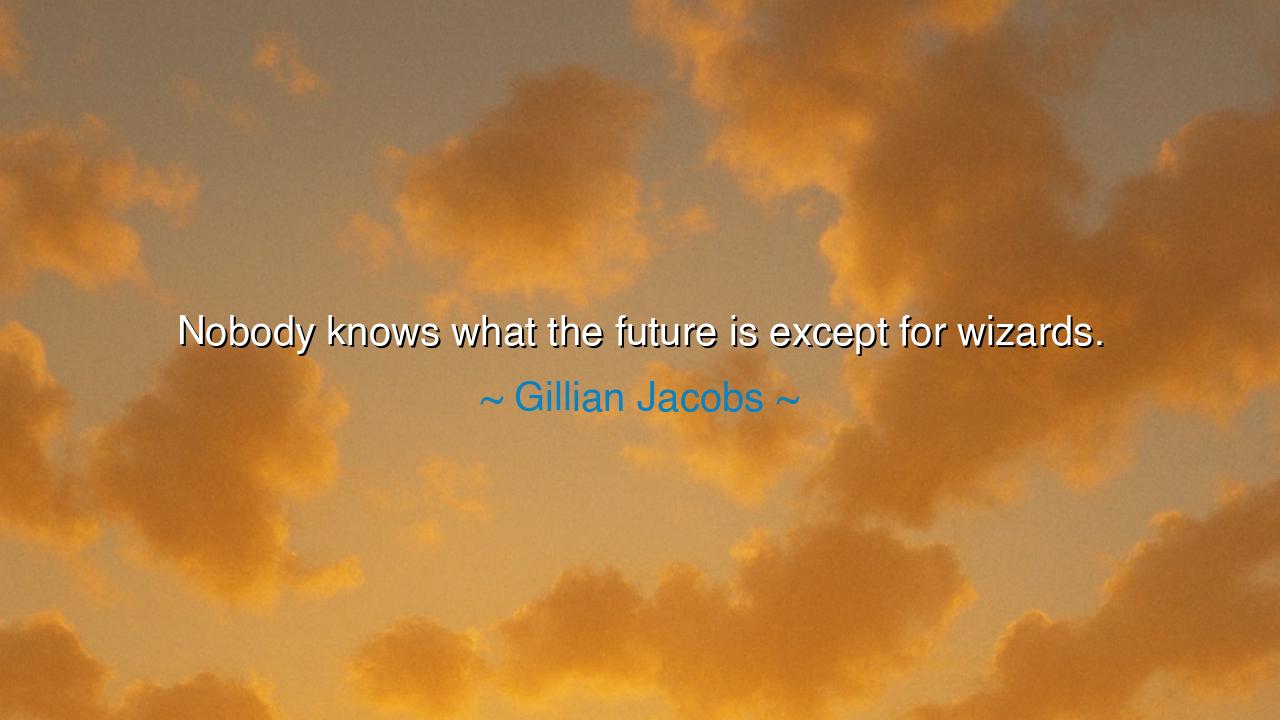
Nobody knows what the future is except for wizards.






In the quiet whispers of time, the truth becomes clear: the future is an unknowable force, a storm yet to gather its winds. As Gillian Jacobs so wisely puts it, "Nobody knows what the future is except for wizards." This proclamation, though spoken in jest, holds within it a profound insight about the nature of the future—a realm that is both elusive and filled with mystery. It is a place where uncertainty reigns, and where only those who possess the rarest of powers, the wizards of the world, seem able to peer into its depths.
The ancient sages, from Socrates to Confucius, spoke often of the unknowable aspects of life. They understood that to attempt to predict the future with certainty was the folly of pride. The future, like the wind, cannot be controlled or fully understood by mortal men. It is a force that cannot be captured, only observed and interpreted. The true wisdom of the ancients lay not in attempting to divine the future but in preparing oneself to meet it with resilience and courage. As Heraclitus once said, "The only constant is change." To look into the future, then, is to acknowledge the inevitability of change and the beauty of life’s unfolding mystery.
Yet, we are not without hope. The notion of the wizard—those rare individuals who possess knowledge and power beyond the ordinary—is deeply embedded in our myths and legends. The wizard is often depicted as someone who, through great wisdom, can glimpse the future, manipulating time and space to shape outcomes. These figures, such as Merlin in Arthurian legend or The Oracle of Delphi, hold the key to understanding the unknowable, offering us a glimpse into what may come. In this sense, the wizard represents wisdom, an understanding that is beyond the reach of ordinary men and women. They see not only the future but the interconnectedness of all things.
However, Gillian Jacobs’s statement is a reminder that, while the wizards may have access to insights that ordinary mortals do not, the vast majority of us are bound by the laws of time and uncertainty. Take, for instance, the story of Alexander the Great. In his conquests, he sought the wisdom of soothsayers and mystics, hoping they could reveal his fate. Yet, no matter how much he sought to know the future, he could not avoid his untimely death. The future, no matter how much we desire to understand it, remains a mystery, shaped by forces beyond our comprehension.
The lesson here is not to seek to control the future or look to others for certainty, but to embrace the unknown with strength and courage. Fate is not something to fear, but something to navigate. The great philosophers and warriors of history, like Julius Caesar or Confucius, understood that the future is not something one can predict with absolute certainty. Instead, they focused on adapting to the present and using their wisdom to shape the outcomes of their actions. It is not the knowledge of the future that makes a person great, but the wisdom to act boldly in the face of the unknown.
As we go forward in our own lives, we must remember that while we cannot know what lies ahead, we do have the power to shape our paths. Just as Heraclitus teaches, we must accept change and embrace it as part of our journey. Let us act with purpose, knowing that the future is not a thing to be feared but a canvas yet to be painted. We are not wizards, nor do we need to be. We are humans, capable of great things not because we can see the future, but because we have the strength to face it, one step at a time.
So, let us live boldly, not in the shadow of uncertainty, but in the light of the possibilities that lie before us. The future, though it remains hidden, is ours to shape. Let us not wait for the wizards to tell us what will come, but instead, let us walk into the unknown with courage, grace, and the understanding that it is our actions in the present that will create the future. As we journey through life, we must remember: the future is not a destination, but a path to be discovered with each step we take.






AAdministratorAdministrator
Welcome, honored guests. Please leave a comment, we will respond soon